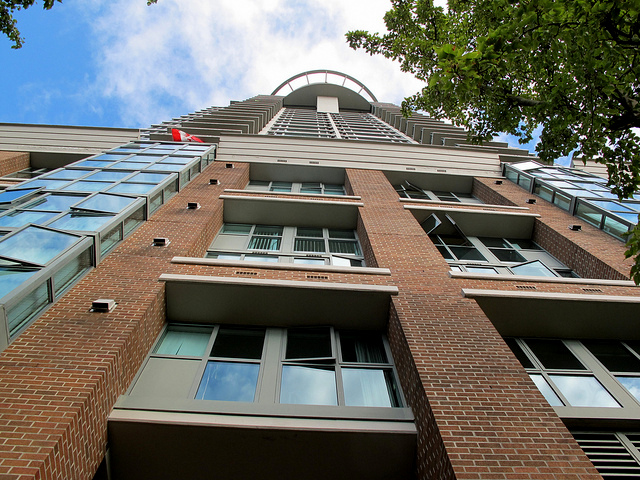The Greater Vancouver Area and the City of Vancouver have been witnessing a slowdown over the last couple of months. There are several reasons for the Vancouver real estate market cooling, such as the changes in mortgage rules (introduced by the federal government in July 2012), as the maximum amortization has been reduced to 25 years from the previous maximum 30 years. This move obviously generated a reaction from buyers, as they experienced difficulties getting new mortgages from banks.
The bigger factor in declining sales is the consumer sentiment that home prices will continue to decline — at least for now. Home buyer demand remains below historical averages, and many homes were removed from the Vancouver real estate market in recent months. Eugen Klein, REBGV president said:
When a home seller isn’t receiving the kind of offers they want, there comes a point when they decide to either lower the price or remove the home from the market. Right now, it seems many home sellers are opting for the latter.
Although realtors were optimistic about the real estate market turning around in the beginning of 2013, the following numbers show the opposite. Greater Vancouver recorded its second lowest January in home sales since 2001, which is 18.7 per cent below the ten-year sales average for the month.
In comparison to the 1,577 residential property sales in Greater Vancouver on the Multiple Listing Service® (MLS®) this time last year, there was a 14.3 per cent decrease in January 2013, with 1,351 sales, and an 18.3 per cent increase compared to the 1,142 sales a month ago.
The MLS HPI® composite benchmark price for all residential properties in Greater Vancouver continues its declining trend with $588,100 in January 2013. Compared to this time last year, the benchmark price fell by 2.8 per cent and compared to the peak benchmark index of $625,100 in May last year, there’s been a 5.9 per cent continuous decline as well. Klein said:
Home sale activity has been below historical averages in Greater Vancouver for about seven months. This has caused a gradual decline in home prices of about 6 per cent since reaching a peak last spring.
The total number of homes listed for sale on the region’s MLS® reached 13,246, increasing by 5.6 per cent compared to last year’s results. This also represents 4.5 per cent drop in activity compared to December 2012, making it the fourth consecutive month that overall home listings have declined in the Greater Vancouver Area.
New listings for detached, attached, and apartment properties totalled 5,128 in January — a 14.4 per cent decline in growth compared to January 2012, when new listings amounted to 5,756. Last month’s new listing count was 18.9 per cent higher than the region’s ten-year new listing average for the month.

Vancouver by m.gifford
Sales plunder
Klein shared his view on the January home sellers’ market situation:
It appears many home sellers are opting to remove their homes from the market rather than settle for a price they don’t want.
• Detached property sales on the MLS® (542 units) experienced a substantial 17.8 per cent fall compared to January 2012 (659) and another massive 31.1 per cent decline compared to January (793 units). The benchmark price fell by 3.1 per cent compared to last year’s stats to $901,000. Since reaching a peak in May, the benchmark price of detached homes declined 6.9 per cent.
• Apartment property sales (576) declined 13.3 per cent compared to January 2012 (657) and 19.2 per cent compared to January 2011 (713). Since reaching a peak in May 2012, the benchmark price for an apartment property in Greater Vancouver declined 5.6 per cent to $358,400. Since last year, the benchmark price fell by 2.9 per cent.
• Attached property sales (233 units) experienced a 10.7 per cent decline compared to January 2012 (261 units), and a 25.6 per cent decrease compared to January 2011 (313 units). There was a 1.7 per cent drop of the benchmark price for attached homes between January 2012 and 2013 to $449,900. Since reaching a peak in April 2012, the benchmark price for an attached property in Greater Vancouver has declined 7.7 per cent.
However, there is a silver lining to this cloud. Canada leads with the strength of its banking system, and our economy is one of the top economies in the G20. B.C. is still a leader in intra-provincial migration, and Vancouver is considered a favourable place to move. The fundamentals of population growth, employment growth, and stronger economic activity in B.C. should support a higher level of housing sales than we saw in January. The listing inventory in Greater Vancouver is supposed to head upward in February throughout the upcoming spring.



[…] Vancouver Real Estate Market Sales Cool in January … – Jay BanksGreater Vancouver recorded its second lowest January in home sales since 2001 , which is 18.7 per cent below the 10-year sales average.jaybanks.ca/…/vancouver-estate-market-sales-cool-in-january/ […]